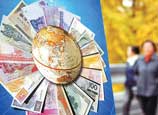
Edied and translated by Liang Jun, People's Daily Online
Final consumption contributed 51.8 percent to China's economic growth in 2012, lower than the world average rate of 80 percent, according to figures released by the National Statistics of Bureau (NBS) recently.
Zhu Tian, professor of economics with the China-Europe International Business School (CEIBS), thinks views on "insufficient domestic demand" have greatly underestimated China's consumption level and the real consumption rate should account for 60 to 65 percent of China's GDP.
Household consumption is underestimated
Zhu Tian believes household consumption consists of spending on rent, housing repair and maintenance as well as bills for utilities. Rent includes actual rent paid by tenants and virtual rent of land owners. The virtual rent is calculated by construction costs being multiplied by a fixed depreciation rate (2 percent for urban housing and 3 percent for rural housing). Using this method, it is easy to calculate, but real household consumption is greatly underestimated.
Another reason for underestimated consumption is that statistics do not include private consumption paid by companies, which is generally regarded as operating costs of companies, according to Zhu Tian. Private consumption includes purchase of private cars, travel expenses, and more.
It is impossible to find out such kind of spending. If it accounts for 10 percent of total household consumption, then the ratio of actual consumption accounting for the GDP is underestimated by 3.5 percentage point.
Even without considering the underestimated or omission of consumption expenses, China's consumption accounted for 60.9 percent of the GDP in 2010, while the official figure was 47.4 percent.
If China's consumption rate is not low, what will stimulate economic growth? Zhu Tian thinks investment and improved efficiency will promote economic growth. Theoretically, consumption is not the engine of growth. Economic growth should be achieved through investment.
So China's economic reform lies in improving efficiency, not stimulating consumption, according to Zhu Tian.
Read the Chinese version: 专家称中国经济改革应提高效率 不是刺激消费


















![]()
